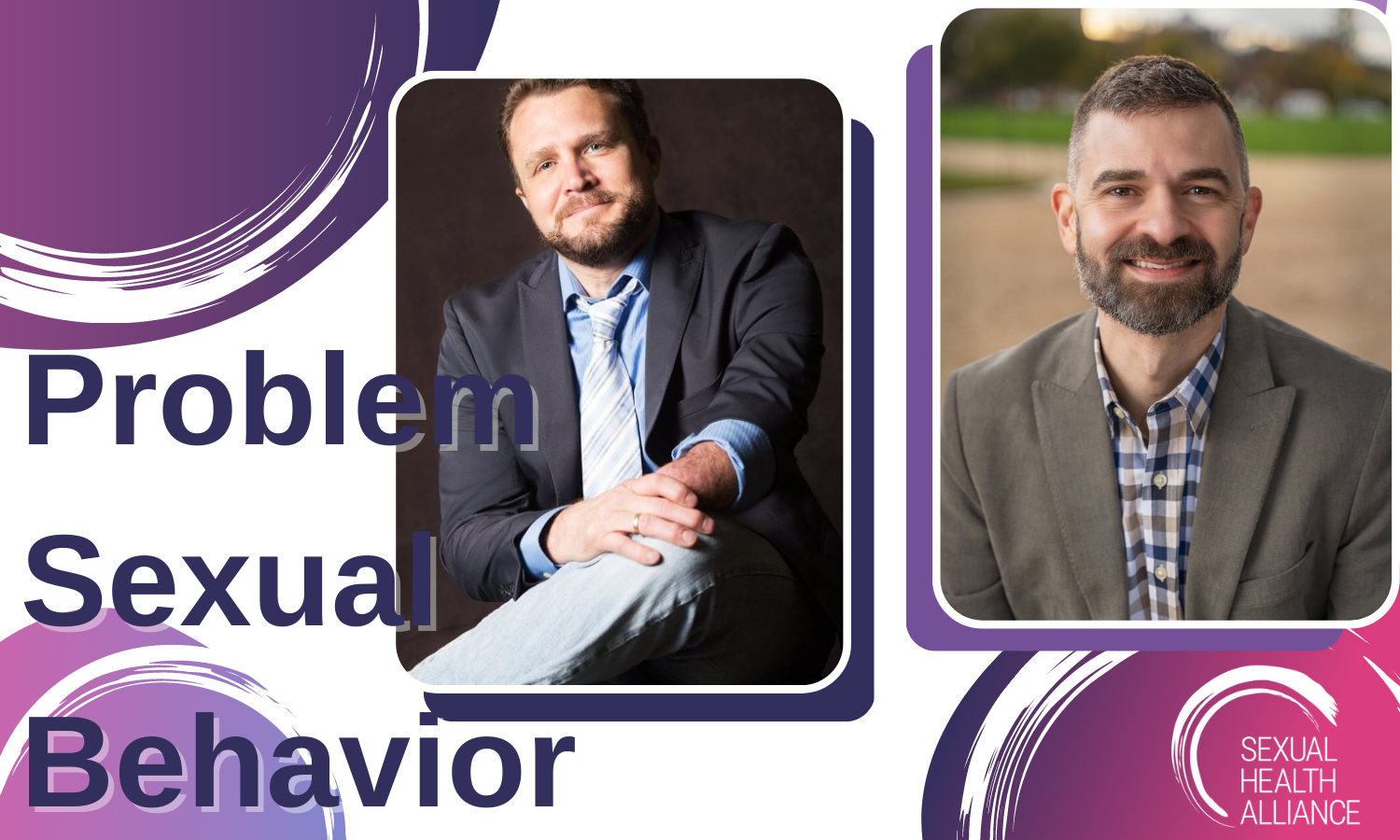Are you ready to dive into Sexual Health Alliance’s Problem Sexual Behavior certification program?
Join sexuality experts Dr. David Ley and Michael Vigorito as they lead the SHA Problem Sexual Behavior program with their extensive knowledge and expertise on out of control sexual behavior.
Here you will learn all about the PSB certification program framework, key components of the program, and the dangers of a “sex addiction” label. The SHA Team has put together some free resources for you to learn more about revisiting the idea of sex addiction, along with AASECT’s stance on the sex addiction terminology. (Spoiler Alert: AASECT 1) does not find sufficient empirical evidence to support the classification of sex addiction or porn addiction as a mental health disorder, and 2) does not find the sexual addiction training and treatment methods and educational pedagogies to be adequately informed by accurate human sexuality knowledge.)
Ready to learn all of the latest and greatest in the area of Problem Sexual Behavior? Let’s go!
CERTIFICATION IN PROBLEM SEXUAL BEHAVIORS PREPARES CLINICIANS TO:
Conduct a thorough, careful, and individualized assessment in order to identify and plan treatment that addresses an individual’s specific needs.
Provide all assessment and treatment from within a framework of sexually healthy values, rather than promoting or condemning certain sexual acts.
Learn to promote the development and growth of positive coping skills, social supports, and personal resources, enhancing patients’ motivation for change and creating a personal context that facilitates sexual health.
Assess and treat (where appropriate) issues related to problematic use of pornography/sexually explicit material, assisting patients in developing greater mindfulness, personal responsibility, and negotiation skills around their use of this material, while helping the patients to better understand the coping needs the material sometimes fills.
Identify primary mental health issues such as depression, anxiety, trauma, and personality disorders, as well as medical problems which may affect sexual functioning and emerge as sexual behavior issues.
Provide affirmative, evidence-based care which embraces the wide range of sexual diversity, and assists patients in understanding and integrating sexual desires that have been socially stigmatized, including LGBTQ, gender variance, consensual nonmonogamous relationships, fetishes, and kinks.
Implement harm reduction strategies and cognitive-behavioral interventions to mitigate sexual behavior problems, enhancing patient self-determination without the expectation of an abstinence-based model.
Assist patients in developing and negotiating sexual needs, discrepancies, and libido mismatches within relationships.
Assist patients in identifying the moral and religious values conflicts that underlie many Problem Sexual Behaviors. Understanding that religion serves a very positive role for many people, but can exacerbate sexual problems, the PSB certified clinician will assist patients in engaging in values exploration and reconciliation exercises to explore and develop an authentic relationship with their values and religion.
Assess and identify problem sexual behaviors which pose a risk to others, including pedophilia, sexual violence, and nonconsensual fetishes and sexual behaviors, developing appropriate referrals and treatment strategies in conjunction with the models used by ATSA for the treatment of sexual abuse.
Address the core social and personal issues of sexual shame, lack of sexual education, and restrictive sexual values which contribute to the struggles and pain experienced by those struggling with Problem Sexual Behaviors.
Why Sex Addiction Treatment and Phrasing is Hurting our Clients
So at this point, we have a wealth of information supporting the very real consequences of the sex addiction diagnosis. For instance, one recent study of sex addicts in treatment showed that 90% had a major mental health disorder such as anxiety or depression, and 60% had a paraphilia, a fetish or a sexual disorder. But, these individuals were receiving treatment for “sex addiction” as opposed to their depression, anxiety or sexual disorder.
Multiple other studies now reveal conclusively that sex addiction is a label rendered overwhelmingly on males (90-95% of sex addicts are males), and half of those males are white, heterosexual, religious (most often Christian and very high rates of Mormon) married males who are middle to upper class in income. This raises two significant issues: 1. Sex addiction is a label applied to diagnose the long-standing sexual privilege held by powerful, privileged males, who are allowed or excused from sexual misbehaviors. 2. There are huge issues here of religion. Religious therapists diagnose sex or porn addiction at far higher rates than secular therapists. Multiple studies now show that the self-identity as a sex/porn addict is predicted by one’s religious values about sex, not actually by frequency of sex. In other words, these folks don’t actually have more sex than others, they feel worse about it. That’s a values conflict, between the sexual values taught in many conservative religious traditions (I’ve seen this in Christians and Muslims for instance) and the sexual opportunities in porn, casual sex, hook-ups, etc., which are available in the modern world. In essence, it’s like the problem of abstinence-only education – we teach kids next to nothing about sex, then are surprised when they struggle with unhealthy sexual behaviors or feel out of control with regards to their sexual desires, because they were never taught to understand or self-manage them. The same is true for a great many people today, raised in highly religious environments, who then encounter the wide world of modern sexuality, and feel overwhelmed by the opportunities available.
More Information about Sex Addiction and why it has no place in modern sex therapy or sex education
Nymphomedia Blog Articles:
How The Concepts of “Sex Addiction” and “Porn Addiction” are Failing Our Clients
Modern Sexual Issues in Education and Therapy from Dr. David Ley: Conference Takeaways
AASECT Summer Institute: Revisiting 'Sex Addiction' (Part 7) with Michael Vigorito, LMFT, LCPC, CGP
AASECT Summer Institute: Revisiting 'Sex Addiction' with Dr. David Ley
AASECT Summer Institute: Revisiting 'Sex Addiction' (Part 4) with Dr. Neil Cannon
AASECT Summer Institute: Revisiting 'Sex Addiction' (Part 5) with Dr. Eli Coleman
AASECT Summer Institute: Revisiting 'Sex Addiction' (Part 6) with Ruth Cohn, LMFT, CST



